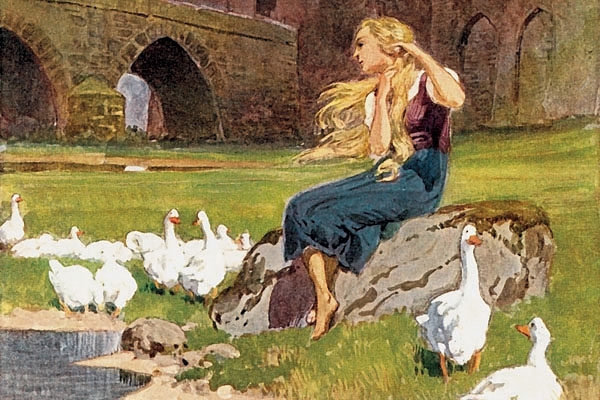The Grimm brothers’ fairy tales are gruesome. Heads are cut off and sometimes stuck back on again. Children are maimed, or chopped up, cooked and eaten. Broken promises are punished horribly, though a magic bird or a talking animal can sometimes make everything come right.
Yet those tender-minded parents are misguided who keep their children away from Grimms’ tales for fear of instilling terrors. Little children know about terror already because they are afraid of being abandoned, and of big strangers. With no prompting from anyone, they play games involving much noisy bashing and killing of imaginary monsters. The magical thinking of children (as of pre-industrial, unlettered adults) expresses the hopes and fears of those who just don’t have enough information about the conditions of their existence.
Most adults filter out the poetic truth of what cannot (yet) be scientifically proved; or we think we do, though Philip Pullman acutely flags his lively retelling of the tales as ‘For Young and Old’. He himself, as his amazing novels attest, is equipped with a psychic borehole down to a parallel universe somewhere between imagination and revelation. He is not very interested in what he calls in his introduction ‘ponderous interpretation’ of the stories, to which modern scholars have submitted them — ‘Freudian, Jungian, Christian, Marxist, structuralist, post-structuralist, feminist, post-modernist and every other kind of tendency’. Much of this ingenious interpretation, he thinks, ‘is little more than seeing pleasing patterns in the sparks of a fire, but it does no harm’.
The brothers Grimm published their first edition in 1812 and the seventh and last in 1857, their versions becoming more pious and prudish as they grew older. Curiously, since their collection can only be compared with the Arabian Nights for its fame and spread, their primary concern was philological. They were interested in German dialects, and produced the first great German dictionary. They did no fieldwork among country people, but acquired the stories from friends who did.
Somehow the scholarly brothers struck the pure source. Pullman is interested in, and interesting about, the stories simply as stories — their clarity and simplicity, and how they work. The characters are flat, with no individual psychology. They are either good or bad. Many have no names, and come in undifferentiated sets — three sons, 12 princesses, seven dwarfs. (Disney gave the dwarfs names, and their distinguishing childish characteristics — ‘toddlers with beards’, Pullman calls them.) There is little description in the tales, other than the formulaic ‘as white as snow’, or ‘as red as blood’. There is a convention of ordeals, bargains, vows that must be kept, in order to win the heart’s desire or avoid death. Envy, revenge and greed are often the motivations. God features hardly at all. We are in pagan territory.
Parents cannot afford to keep their children, and drive them away, or else long for children and seek magic to conceive them. They are shoemakers, millers, merchants, or else princes and kings. The recurrent dazzlingly beautiful daughter, whether of a miller or a king, always has golden hair — not just fair hair, but as glitteringly golden as the gold coins, rings and chains which are lost and won and have magic powers.
Spinning-wheels and bobbins have resonance beyond their utility. And
everywhere, in so many of the stories, is the great dark forest, where people get hopelessly lost, then come across a cottage in a clearing where there is an old woman living alone, usually a witch. A geo-
sociological analysis might be as illuminating
as the kind of thing that Pullman dismissively calls ‘sub-Jungian twaddle’ — which can perhaps be seen as the magical thinking of our own times, though he doesn’t say so.
A storyteller himself, Pullman has no scruples about fiddling and adapting. In the notes to each story, he complains about inconsequentiality, ‘unhelpful gaps’, important characters who drop out of the narrative, and just ‘clumsy storytelling’. He makes changes for the sake of timing, or because he wants to give certain characters ‘a bit more to do’. He proposes in the notes variants and developments of his own (‘I think that would work quite well.’ This is fair enough. Orally transmitted tales are never definitive.
But subjectively, they are. He does not sufficiently stress repetition — of actions, or threats or promises, often in verse — as a key characteristic. Children love repetition, and the version of any fairy story or folktale one knew as a child, or read to one’s own children, does seem definitive, like the preferred recording of a piece of music. So when in Pullman’s version the repetitive incantatory element of, say, ‘The
Fisherman and his Wife’ is not the same as the one I know almost by heart, I am utterly thrown. Clearly, there are young people and old people, but no grown-ups.






Comments